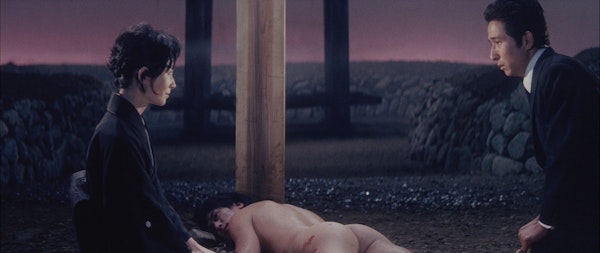The film begins with Masuo Sakurada receiving a telegram from his cousin Terumichi. He is traveling with his cousin Ritsuko to check out his cabin and see if the telegram is true. Masuo has a flashback to the ceremony on the first anniversary of his father's death, after he and his mother repatriated to Japan from Manchuria. Because his younger brother died before they returned from Manchuria, Masuo is expected to live for two sons.
Throughout each of the ceremonies, the tangled family web is revealed, with numerous instances of incest that make the relationships between each of the family members somewhat unclear. The continued incest is not only expected amongst the family. Masuo himself is interested in Setsuko, and later Ritsuko, and finds himself in competition with Terumichi for them.
Masuo finds himself sacrificing much of his freedom for the family. He has a talent for baseball, but gives it up when his mother dies and he is not present. He burns all of his baseball possessions except his glove. His sacrifice reaches its climax when he goes through a marriage ceremony to an absentee bride at his grandfather's insistence. He finally releases his frustration and hatred for his grandfather afterward. His grandfather dies years later, and at his memorial service Masuo is asked by his uncles to marry as quickly as possible to have another heir to the family lineage.
Masuo and Ritsuko finally arrive at Terumichi's cabin in the film's final segment, to discover that the telegram informing them of Terumichi's death is true. Ritsuko feels an obligation to commit suicide next to Terumichi, because he had been her lover. Masuo leaves the scene, and outside has a flashback to a childhood memory of playing baseball with his cousins and Setsuko, who have all died.
"Cast as a family saga, the film focuses on a young boy in Manchuria, and his mother, who make it back home after the war to rejoin the powerful Sakurada clan." (Asianwiki)
"Brilliant and haunting... a truly modern film, but with classical echoes... it is not to be missed." (Andrew Sarris, Village Voice)
Image gallery


Credits
Nagisa Ôshima
Tôru Takemitsu
Kenzô Kawarasaki, Atsuko Kaku, Atsuo Nakamura
Mamoru Sasaki, Tsutomu Tamura, Nagisa Ôshima
Tôichirô Narushima
Keiichi Uraoka
Kinshirô Kuzui, Takuji Yamaguchi
Art Theatre Guild (ATG)
More info
Japanese
Japan
1971
